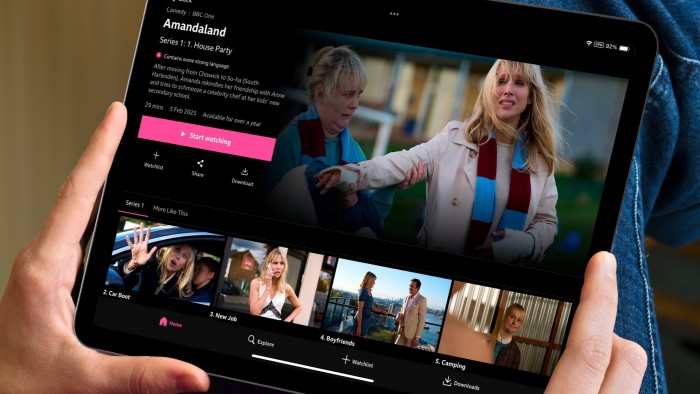Stay informed with free updates
Simply sign up to the Media myFT Digest — delivered directly to your inbox.
The BBC will use AI across a range of its offerings from iPlayer and its Sounds radio and podcasts app to its World Service and sports reporting, as it promised greater investment in social media to reach new audiences at a time when consumption of UK-made shows is at risk.
As part of proposals outlined in its annual plan, the BBC said that its digital TV and radio would offer increasing personalised services for consumers, similar to how rival streamers use algorithms to suggest recommended programmes.
AI tools will also be used internally, such as translating BBC World Service to develop services in new languages, and helping create live text pages from multiple football broadcasts.
The BBC said that it would “embrace AI with pilot programmes that will help us deliver trusted journalism to a wider audience in more relevant formats”.
However, BBC insiders insist that the national broadcaster will ensure that it is not simply offering what is popular, unlike private sector rivals that are focused on driving revenues.
This would mean mixing AI services and personalisation with its public service editorial aims, one said. “How do you better serve content that would be interesting as a consumer but not simply drag you down a narrow path of popular shows?”
In the annual plan published on Monday, the BBC also warned that consumption of British content was at risk as viewing shifts to international streamers.
It said that the cuts to global TV commissions were likely to put further pressure on British production companies, and raised new fears that the regions of the UK would be hardest hit.
“A concentration of spend into high budget genres may lead to proportionately greater activity in and around London”, it warned.
The BBC promised to explore options with the industry around how global media organisations could contribute more to supporting UK content, as well as looking at collaboration with other public sector broadcasters such as Channel 4 and ITV.
The broadcaster will also increase investment in genres that drive the greatest value in streaming and appeal to audiences who get less value from the BBC, as it faces criticism that it does not do enough to appeal to everyone in the UK.
The BBC will work to put more content on social media, using YouTube, TikTok and Instagram, to reach younger audiences. It said it would also seek to improve its news offering on iPlayer.
“As news consumption increasingly moves online, we are strengthening our commitment to a compelling iPlayer-led news offer, with breaking news and outstanding in-depth documentaries at its heart,” it said.
The BBC also revealed that it expected to make a financial deficit of about £33mn in the coming year after a rise in cost of the licence fee was offset by a 1 per cent fall in numbers of households paying the tariff, as well as the cost of restructuring.
BBC insiders warn that there would be further cost-cutting this year in areas such as its news coverage, which could involve more job losses. The BBC said in its plan that income was down £1bn a year in real terms compared with its funding in 2010. It has previously said it was aiming to save £300mn per year by 2027-28.
The broadcaster said that it would increase tracking of events in Russia and China, as well as focus more on Donald Trump’s presidency and the developments in Syria. It is expanding BBC Verify to make it an “always on” offer, with daily digital output and a dedicated commitment to US coverage.
